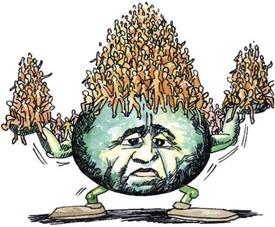
Overpopulation is an undesirable condition where the number of existing human population exceeds the carrying capacity of Earth.
Pressures resulting from unrestrained population growth put demands on the natural world that can overwhelm any efforts to achieve a sustainable future. If we are to halt the destruction of our environment, we must accept limits to that growth.
Population growth is a root cause of many environmental and social problems. They include:
- Over 1 billion people do not have enough food and safe drinking water.
- Global warming is disrupting our ecosystems and threatening billions of people with dislocation.
- Energy sources, from wood to oil, are becoming scarcer and harder to reach or extract.
- Due to population pressures, people now live in areas that are basically unsafe. Hundred of thousands of people died in 2010-2011 because they lived on floodplains in Pakistan or by the tsunami-prone coast of Japan.These regions were sparsely populated 30 years ago.
- Population growth shares complex ties to poverty and inequality, exacerbating the gap between the wealthy and the poor, and complicating access to Earth's finite resources.
- In the U.S.alone, sprawl destroys 2.2 million acres of farmland, ranchland and forest every year.

In order to reduce the adverse impacts of overpopulation, mitigation measures, such as spreading awareness and education about overpopulation, enacting birth control measures and regulations, and providing universal access to birth control devices and family planning, must be taken.
The worldwatch institute has released state of the world 2012: Moving toward sustainable prosperity and in the chapter "nine population strategies to stop short of 9 billion," worldwatch institute president Robert Engelman argues that, "If most or all of these strategies were put into effect, global population likely would peak and subsequently begin a gradual decline before 2050, thereby ensuring sustainable development of natural resources and global stability into the future. By implementing policies that defend human rights, promote education, and reflect the true economic and environmental costs of childbearing, the world can halt population short of the 9 billion that so many analysts expect."
Nine population strategies to stop short of 9 billion:


No hay comentarios:
Publicar un comentario